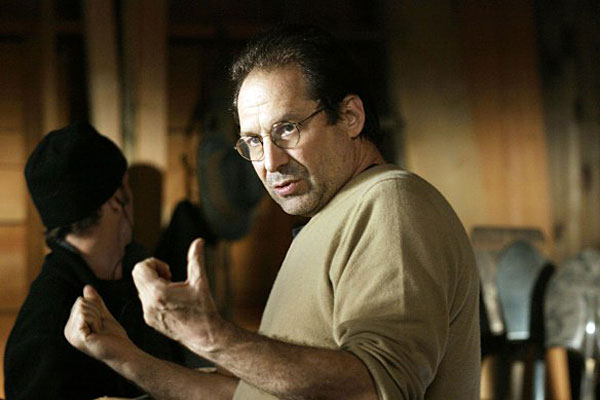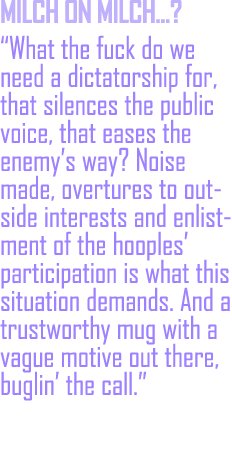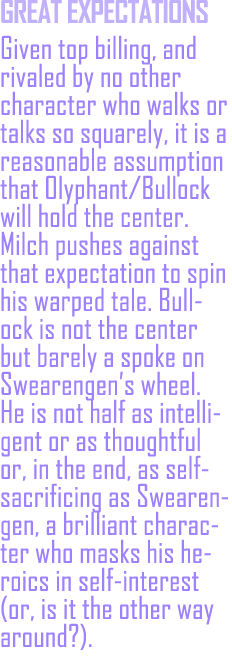
Jesus Christ! The fucking gimp finds something useful to do
in the fucking brace you made her! Do you think you could treat
being Johnny—always struggling to fashion a thought?! Every
fucking night I, that could cut a throat but sleep the sleep of
the just, spend six fucking wakings trying to find a piss pot
with my dribble, and wondering when I got to be so old.
(He throws the swatches down onto Doc.)
Pick a fucking swatch for a spit rag, use the others for masks,
and go about your fucking business!
I ain’t learning a new Doc’s quirks.
—Al Swearengen,
Unauthorized Cinnamon
I am not a man.
I can write men, I can invent men, men of valor and purpose and
resolve. Unbendable, unbreakable men who stare down adversity
and challenge injustice. These fictional men are the reason we
go to the movies, why we buy books and, yes, comics. The hero
fantasy is likely the most basic human beings have as men
and women alike gravitate toward powerful figures; powerful in
courage and resolve if not in physical or “super” strength. The
real world is very cruel in the sense that men like this are an
extreme rarity and they are usually killed. Our national role
models are a bunch of simpering, whiny mama’s boys in Washington
who are about as rugged as Frazier Crane and who invoke a veneer
of self-righteousness and call it courage. These men always have
ulterior motives and their pretense to courage exists only to
manipulate people.
Deadwood’s Seth Bullock is a real man, which is what makes
Timothy Olyphant’s portrayal so watchable. It is also what makes
Justified, Olyphant’s subsequent Elmore Leonard-produced
vehicle, so disappointing. I had hoped Justified would be Seth
Bullock In 2011. But Raylan Givens, Olyphant’s Justified U.S.
Marshal, is nothing at all like the brooding, disturbed Sheriff
Bullock of Deadwood; which is a crying shame. I don’t think
Givens is more entertaining than Bullock, though he has more
dimension. A character like Bullock, mean, short-tempered and
evidently self-loathing, couldn’t possibly hold the center of a
regular series though he pretends to, here. Truth is, there are
many episodes where Bullock hardly shows up and barely speaks.
Olyphant receives top billing in every episode, while Ian McShane, who plays Bullock’s scenery-chewing foil Al Swearengen,
often recites the equivalent of the King James Bible in most
episodes, yet his name comes in second.
McShane’s Swearengen drives the story. Deadwood could likely be
subtitled "The Education of Seth Bullock,” as show creator and
TV scripting demigod David Milch has composed a plot so densely
layered the show threatens to be much more intelligent than its
audience. I learned almost nothing about the story the first
time through, where I was frequently confused and lost in the
twists through the alleys of Milch’s mind. Having now completed
a second viewing (and with the aid of subtitles and a pause
button), I had a much richer experience. While presented as the
heavy, Swearengen is actually an anti-hero. Bullock is only at
center in the minds of the audience who surely expect the
sheriff to eventually be the good guy. Given top billing, and
rivaled by no other character who walks or talks so squarely, it
is a reasonable assumption that Olyphant/Bullock will hold the
center. Milch relies on that expectation to spin his warped
tale. The overall story is never about Bullock but about
Swearengen. Bullock is not the center but barely a spoke on
Swearengen’s wheel. He is not half as intelligent or as
thoughtful or, in the end, as self-sacrificing as Swearengen, a
brilliant character who masks his heroics in self-interest (or,
is it the other way around?). His actions are heroic nonetheless
because, in pursuit of his own interests, Swearengen saves the
muddy, dumpy little camp he all but founded. While retaining his
top billing, Bullock is, by season three, shunted off as just
another cast member while Swearengen is in practically every
scene.
Swearengen’s total domination of Bullock begins with the second
season premiere, where Swearengen picks a fight with Bullock to,
ostensibly, wean Bullock from a distracting and potentially
destructive affair with Mrs. Alma Garet, widow of a rich idiot
from New York whom Swearengen’s henchman helped down off a
mountain. The camp’s very existence is imperiled by the looming
threat of a wealthy industrialist, played to villainous
perfection by Gerald McRaney, and Swearengen needs Bullock—the
square-jaw face of the camp—to keep his sainted image
untarnished and get focused on the gathering storm. The ensuing
battle is quick, brutal, and appropriately epic, and we wait
patiently for the following 21 episodes for another. It never
comes.
Milch’s overly languid storytelling pace is enormously
frustrating. He wiles away entire episodes with length
soliloquys—brilliantly written, but we want some action. There
is always the threat of action, but Deadwood is not an action
show, not even a Western by traditional standards. Not one
single Main Street gunfight, precious little fisticuffs, and a
maudlin over-abundance of heinous misogyny which left me
cringing as I wondered how accurate that was: were women,
prostitutes in specific, really treated that badly?

The Effing Bard: Effing Milch.
Effing Cooksuckers
Anyone familiar with the series can tell you Deadwood is written
in an often-perplexing “Profane Shakespeare.” Creator David
Milch’s inventive uses of the F-word is likely unparalleled in
TV history, though it makes me wonder if people actually talked
that way; I’d always assumed that word to be a relatively modern
invention. It is, in the end, this wonderfully profane poetry
that dazzles the most. Finger on the pause and subtitle buttons,
I remained enthralled with the lingo from start to finish, even
as I was aghast at how racist and misogynist the accepted norms
were.
The real, historical Seth Bullock was a Republican who lost the
sheriff’s election in a landslide. Like our Republicans today,
Bullock refused to accept the election’s outcome and did not
surrender power for weeks or months after while challenging the
election in court. In a commentary, Milch see his fictional
Bullock as something of a lost boy, a man who rises, every day,
wishing he could beat the crap out of his father. In Swearengen,
Bullock finds some semblance of a father figure, though he never
acknowledges it. The two never become friends, but they bond
over their common enemy of Hurst. The fictional Bullock is,
however, rendered largely irrelevant past season two’s terrific
2-part opener, which lends an air of frustration to the viewer
who returns, episode after episode, looking for a story actually
about Bullock, or in which Bullock actually moves the narrative.
He does not. He is an extra, a face in the crowd. He is,
essentially, the face of the ragged camp—it’s alleged
champion—but he fights no battles, saves no lives. He briefly
arrests Hurst and we think, finally, we’re getting somewhere,
but even that is a wrong tactical move that only makes things
exponentially worse.
Based on the DVD extras, I am assuming Milch and company were
tailoring their narrative more or less toward the historical
facts. This created an ultimately unsatisfying and frustrating
experience because we’ve all been conditioned to expect certain
things, the hero saving the day among them. But Bullock simply
isn’t that smart. He comes across as wiser than he actually is
mainly because he tends to isolate and saunter around the camp
in an amazing, fun-to-watch pimp roll designed specifically to
shoo people away from him. Swearengen, on the other hand,
tolerates a great many fools and, therefore, is in tune with the
heartbeat of the people Bullock ignores as he saunters past,
steely-eyed.
After a strong start as Swearengen’s rival, Powers Boothe is
completely wasted in season three, making only sparse
appearances in indecipherable scenes. Prior to Hurst’s arrival,
Boothe’s character was the most demonstrably evil guy in the
show. Hurst quickly neuters him, which I suppose was designed to
define Hurst, but you don’t have an actor like Boothe on payroll
and just let him fade away.
This is, however, the mad genius of Milch. Milch may write the
same way I do, in a sloppy intuitive fashion as opposed to the
strict outlining we all learned in school. The difference seems
to be, I will tend to work far enough ahead of production to
irritate my editors with multiple rewrites as I learn more about
my characters and their motives. Based upon the
behind-the-scenes extras, Milch seemed to be winging it; making
it up as they went and writing right up to shooting if not
beyond (there were literally no scripts during Milch’s final
days on NYPD Blue; Milch just showed up on the set (eventually)
and improvised everything. I don’t know if that’s what he did on
Deadwood, but the unevenness of the narrative and the deeply
unsatisfying third season where Milch all but sidelines the lead
character and hobbles the great Powers Boothe while languishing
lonnnnnng scenes on characters we don’t give a crap about (the
theater troop?!?), suggests he may have simply been winging it.
This is no crime, but I can’t help but wonder what might have
been had Milch been far enough ahead of schedule to go back and
polish previous episodes before they were shot.
 Even
When It Bores
Even
When It Bores
"So, including last night, that's three fucking damage incidents
that didn't kill you. Pain or damage don't end the world or
despair or fucking beatings. The world ends when you're dead.
Until then, you got more punishment in store. Stand it like a
man, and give some back." – Al Swearengen
Virtually every character in Deadwood turns in amazing
performances, so going on and on about each of them will only
give me carpal tunnel, but I deeply enjoyed Robin Weigert’s
“Calamity” Jane, a performance that shattered the myth of Jane
having been some kind of superwoman gunslinger. Weigert’s’s Jane
is a terribly tragic, unloved, obnoxious, broken alcoholic who
is ultimately saved by Kim Dickens’s quixotic and compelling
whorehouse madam Joanie Stubbs. Beautiful and terribly insecure,
Joanie nonetheless moves through Milch’s passion play propping
up and reassuring others while desperately trying to avoid
Boothe’s Cy Tolliver, who is obviously in love with her; love
being played for weakness, here, and thus provoking Tolliver’s
abusive nature.
Keith Carradine threatens to upstage everybody as James Butler
“Wild Bill” Hickok. Early into the series, it appears that
Caradine will take a central spot alongside Olyphant’s Bullock,
and we’re off to the races with a pair of fearless gunslingers
at center stage. Of course, this is not what Deadwood is about,
so Milch abruptly interrupts that thinking. But, boy, was
Caradine good.
This is a terribly uneven series, but the brilliance of the
writing remains constant even though the third-season slog of episodes
seemingly phoned in from some off-path motel Milch might have
been staying in. Even when it bores, Deadwood is brilliant, due
largely to Milch’s poetry (and, for all I know, the legion of
writing assistants who assist and embellish). Regular viewers of
network TV (which is beyond awful) simply won’t “get” Deadwood.
It moves way too slow, the dialogue verges on indecipherable,
the hero is a borderline idiot, there’s too many characters to
keep track of, and there are few if any satisfying moments--
Bullock kicking the crap out of Hurst’s sadomasochistic advance
man being one of them. Warned that Hurst will seek retribution,
Bullock snarls in gleefully satisfying hero-villain mix (in my
paraphrase), “You
draw a map and let him know where to find me. And tell him...
I’ll be waiting.”
Huzzah, kids.
Christopher J. Priest
12 November 2013
Home | Blog | Projects | Comics | Rants | Music | Video | Christian Site | Contact
Film Trailer and Stills from Deadwood
Copyright © 2013 HBO. All Rights Reserved.
Text Copyright © 2013 Lamercie Park. All Rights Reserved.
TOP OF PAGE






